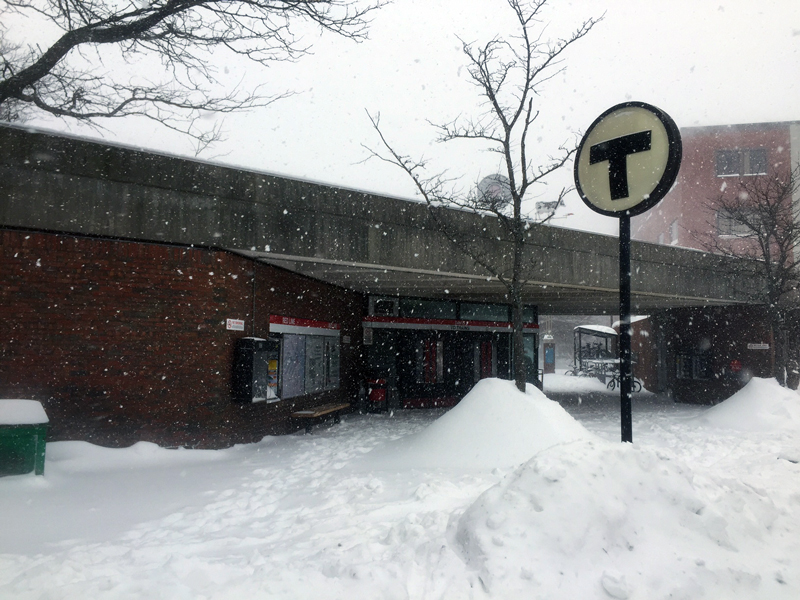
Snow falls in Davis Square, Somerville. Photo: Edgar B. Herwick III
It was an avalanche, a cascade, a blizzard. I’m not referring to the recent snowstorms, but to the outpouring of political and policy pronouncements using the snowstorms as a pretext to push our favorite issues.
What comes first, the problem or the solution? It’s an interesting policy question raised by Deborah Stone in her wonderful book Policy Paradox: The Art of Political Decision Making. If you believe in a rational model of policy making, Stone’s book is there to disabuse you of the notion. Instead she discusses how political speech is used to persuade and to control the meaning of events. So what did the snowstorms and the transportation problems they brought mean?
To one poster on Twitter, the meaning of the transportation was obvious. Let’s thank hard working MBTA employees and fund public transportation.

But to another citizen the problem was just as obvious but quite different:

Another poster saw two opportunities at once, fund public transportation and kill the Olympics:

The misplaced priorities theme was in play throughout the day and not just as applied to the Olympics, as in a tweet from the Globe’s Joan Vennochi.

Lots of policy prescriptions to take into account:

Senator Jamie Eldridge knows how to play this game.

You get the idea. If you have some favorite policy or political issue, whether it be public transportation, greedy public employees, or opposition to the Olympics, the snowstorm and related transportation problems were just the proof your case needed. Case closed.
Another policy lesson here is that the transportation problems may just be the “focusing event” that forces policy makers to address infrastructure and budgetary issues with the T. According to political scientist John Kingdon in Agendas, Alternatives, and Public Policy, a focusing event can push policy makers to address a problem that is understood to exist but is being put off for some reason. For instance, transportation experts have known for some time that the T’s infrastructure is shabby – redline cars that saw service in both the Blizzard of ’78 and the Blizzard of ‘15, for instance. The broken down equipment and acknowledgement by the T that it can’t safely operate up to forty percent of its redline stock is a pretty good focusing event. So are the long waits in frigid temperature inconveniencing commuters and the shut downs that affect business.
Also, policymakers are getting feedback on the T’s problem, as Senator Eldridge’s tweet shows. All of his staff had a problem getting into the State House on Tuesday. To paraphrase a wonderful quote from Kevin McHale about minor surgery, a minor inconvenience is when you can’t get to work. A major inconvenience is when I can’t get to work. Senator Eldridge’s staff suffered a major inconvenience on Tuesday and he is in a position to address it.
There are no neutral events, even a snow storm. They’re all political.

